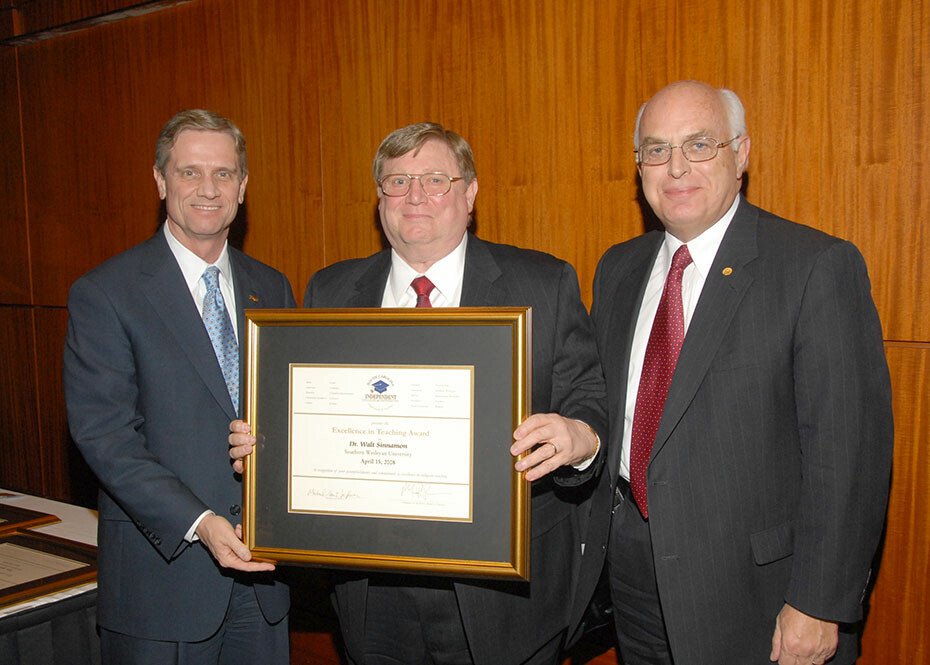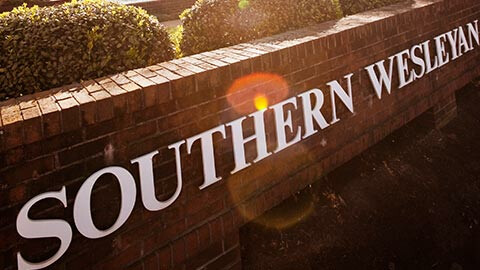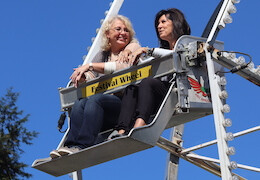Sinnamon receives Excellence in Teaching award

Walt Sinnamon (center), dean of the College of Arts and Sciences at Southern Wesleyan University, received the Excellence in Teaching Award presented by the South Carolina Independent Colleges and Universities April 15 in Columbia. Pictured, from left, are Mike Brenan, chairman of the SCICU board of trustees; Sinnamon; and Dr. David Spittal, SWU president.
Southern Wesleyan University’s Dr. Walt Sinnamon received the Excellence in Teaching Award from South Carolina Independent Colleges and Universities April 15, 2008, in Columbia.
This award is given to one faculty member at each of the 20 SCICU member colleges and universities. Each recipient was chosen by their institution according to rigorous criteria. The most important characteristic of the nominees is their demonstration of the highest standards in teaching methods that encourages students to strive for excellence in their studies and pursuits.
“Dr. Sinnamon is a distinguished scholar whose passion for his discipline has inspired many of his students to pursue science, medicine and research following graduation. He is a demanding teacher that expects the best from his students and his record of placement in graduate and medical schools is testimony to his effectiveness in the classroom and as a scientist,” said Dr. David Spittal, president of Southern Wesleyan University. “Every student deserves to experience the teaching and mentorship of a true champion. Dr. Sinnamon is one of those champions and his list of distinguished graduates provide tangible evidence of his gifts.”
“Dr. Sinnamon’s contributions to the enhancement of Southern Wesleyan’s teaching-learning community cannot be over-stated. He is equally effective in the classroom, in the laboratory, or around the conference table,” said Dr. Keith Iddings, SWU provost.
Sinnamon’s recent students have expressed gratitude as well:
“After your classes, my brain will never be the same.”
“Thank you for pushing me farther than I thought I could go.”
“I am so thankful to have you in my life.”
“You taught me so much while at SWU, not only about science and medicine but also about life in general.”
“Your Christian perspective is evident in all you do and is definitely a great example to follow.”
“I want to say thanks for the great year you have given me in your class. You made class interesting.”
“Being in your class made my decision to go as a premed major much easier.”
“I also found the problem-solving aspects of biology very interesting, which was something I had not seen before.”
Sinnamon, who has served as dean of the College of Arts and Sciences since 2005, recently completed his 26 th year as a SWU faculty member. During his tenure, Sinnamon has taught biology, zoology, ecology, microbiology, human anatomy and physiology and comparative/environmental physiology. Sinnamon has served in a number of administrative positions and has served on numerous committees while continuing to teach. He became special assistant to the president for institutional effectiveness in 1993 and served in that capacity for 10 years overseeing planning, assessment and institutional research. He has also written a number of grants and served as the university’s grants coordinator for two years. He served as the director of the accreditation reaffirmation process from 1997 to 1999. In 2003, Sinnamon became the chair of the Science Division.
Sinnamon has participated in numerous faculty development opportunities over the years and is a member of several professional organizations. He has served as a volunteer professor for the Department of Clinical Services for the Medical University of South Carolina since 2001, has served as a member and chair of the Arts and Sciences Advisory Committee at Tri-County Technical College and was a member of the Institutional Biosafety Committee at Clemson University.
His research centered on the role of the pineal gland in hibernation and he has published papers related to this research in journals such as the Journal of Thermal Biology, Cryobiology, and Comparative Biochemistry and Physiology. He has also presented material related to his research at the meetings of various organizations such as the American Society of Mammalogists and American Society of Zoologists.
Sinnamon has supervised a number of student research projects over the years including “Antibacterial properties of extracts from Solidago altissima and Aloe barbadensis” and “The effects of pulsed high-voltage DC electric field application on strength-duration characteristics of isolated frog gastrocnemius muscle.” He collected a new species of a dipteran, named Xylomya terminalis and the holotype is at Cornell University.
Sinnamon was chosen as the professor of the year at Southern Wesleyan University and received the Ken Dickens Award for Excellence in Teaching for 2007-2008.
Sinnamon also coached baseball for six years and is credited with starting the university’s baseball program in 1985. During that period, Sinnamon took his team to the National Christian College Athletic Association’s national tournament in 1989.
Sinnamon earned a bachelor’s degree from Houghton College and a Ph.D. in zoology with a concentration in physiology from Clemson University in 1985. He and his wife Carol reside in Central. They have a daughter and two grandchildren.
SCICU was established in 1953 with the primary mission of promoting independent higher education in South Carolina. SCICU seeks to advance independent higher education through fundraising, scholarships, research and by facilitating collaborative activities among the 20 member institutions. The member institutions of SCICU educate nearly 33,000 students each year.



